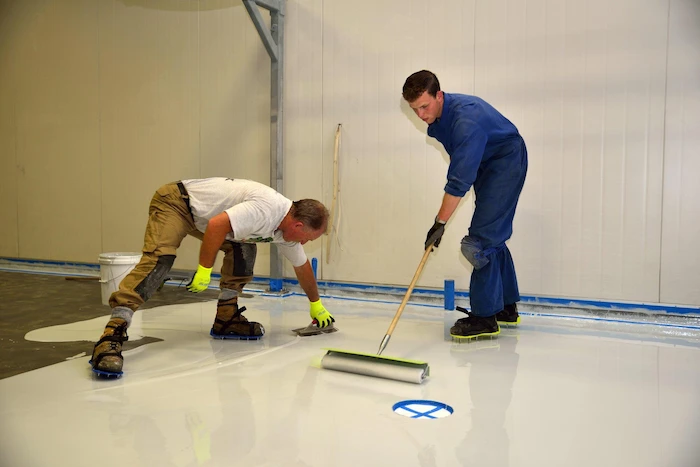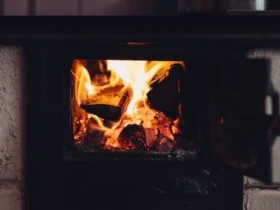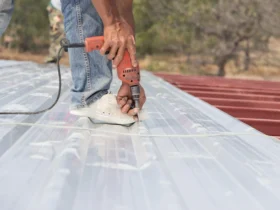Floor coatings are an essential factor in protecting and maintaining the quality of your floors.
However, with so many different types of coatings available on the market, choosing the right one for your specific flooring needs can be overwhelming. To make things easier, we have put together a helpful guide to explore the most common types of floor coatings, their benefits, and which type is best for your flooring needs.
So, whether you are looking to upgrade your concrete garage floor or re-coat your commercial workspace, we have got you covered.
1. Epoxy Coating
Epoxy coatings are one of the most popular types of flooring coatings available. It is made by mixing resin and hardener and then applying it to concrete flooring. It is an excellent option for its durability, reliability, and scratch-resistant properties.
Plus, it is waterproof and easy to clean. The epoxy floor coating is perfect for garages, basements, and other trafficked regions, but it may not hold up under UV light.
2. Polyurethane Coating
Polyurethane coatings offer robust protection for concrete and wood floors. They dry quickly and have excellent resistance to abrasions, chemicals, and scratches.
The coating requires low flooring maintenance and is resistant to high traffic and spacious water exposure. Polyurethane coatings are ideal in commercial spaces like warehouses, showrooms, and factories.
3. MMA Coating
MMA Coating is a methyl methacrylate-based resin that is a popular choice for industrial and commercial spaces. It is used in areas where there is heavy foot and vehicular traffic due to its high resistance to impact, chemicals, and abrasions. MMA Coating can be applied to almost any flooring surface, including concrete, wood, and metal.
It also has a non-slip surface, making it an excellent choice for areas where there is a higher risk of slips and falls. The application of MMA Coating requires careful preparation of the surface to ensure that it adheres correctly.
The surface needs to be cleaned, dried, and sometimes sanded to achieve the best results. MMA Coating is then poured onto the surface, spread evenly, and left to cure for a few hours.
4. Acrylic Coating
Acrylic coatings are used in coatings for tennis courts, basketball courts, and other outdoor surfaces. It is perfect because it withstands UV rays, foot traffic, and weather extremes.
However, they might not work for every indoor space like garages or warehouses since they need reapplication every two years. But, thanks to their quick drying time, acrylic coatings can still be beneficial in time-sensitive situations.
You may like – How to Choose the Right Commercial Floor Cleaners for Your Facility
5. Acid Stain Coating
Acid stain coating is not a layer that sits on top of the concrete but a chemical reaction that occurs between the acid stain and the concrete surface. The acid in the stain reacts with the minerals in the concrete to create a permanent and translucent color variation. The effect is a marbled and variegated appearance that is unique to each concrete slab.
Acid stain coatings are perfect for those who want their concrete floors to look like natural stone or other materials but without the high material cost. The color variations mimic the look of natural stone, yet it is cheaper than the real deal.
Acid-stained floors add depth and dimension to plain, gray concrete surfaces and can be further enhanced with a sealer or wax. However, it is essential to note that the colors achieved in an acid stain are unpredictable, and the final result cannot be guaranteed.
6. Urethane Cement Coating
Urethane is a versatile coating that works well in high-abrasion areas. It is perfect for commercial kitchens, food processing plants, and factories where durability is essential. Urethane cement coatings are resistant to chemicals, impacts, and thermal shock. Besides, they offer excellent resistance to microbial growth, increasing hygienic conditions.
7. Concrete Overlay Coating
This type of coating is a layer of cement that is applied to the surface of the existing concrete. The overlay can be used to resurface old, damaged, or uneven concrete floors to give a fresh look. Concrete overlays come in a variety of colors and patterns to mimic the look of other materials such as tile, brick, or stone.
They are also stain-resistant and easy to maintain. One of the advantages of concrete overlay coatings is that they can also be used to create textured surfaces or patterns.
For example, a concrete overlay with a stamped pattern can give a patio or pool deck a decorative and unique look. The texture of the overlay can also be customized to provide traction and prevent slips and falls, making it ideal for high-traffic areas.
8. Polyaspartic Coating
Polyaspartic coatings are a great choice for areas that need long-lasting durability with a fast curing time. They are like epoxy coatings in application and properties. They’re scratch-resistant, chemical-resistant, and weather-resistant, which is perfect for outdoor patios, garages, and high-traffic areas. Polyaspartic flooring is durable and resistant to UV light.
9. Thermal Shock Resistant Coating
Thermal shock-resistant coating is designed to protect floors from sudden and extreme fluctuations in temperature. If your work environment is exposed to high heat and cold temperatures, this type of coating may be ideal for your space. Thermal shock-resistant coating is durable and able to withstand extreme temperature changes without getting damaged.
It is suitable for use in various work settings, including industrial and food processing plants. Additionally, thermal shock-resistant coating is easy to clean, making it an excellent choice for areas that need strict hygiene standards. It is also stain-resistant and does not wear off, making it a cost-effective option for high-traffic areas.
You may like –Understanding the Different Types of Transmission Filters
Dive Into the World of Floor Coatings and Find What You Need
Choosing the right floor coatings can protect your floors, delay wear and tear, and give your floors the best look possible. Each floor coating comes with its unique benefits, and you may need to spend some time matching the floors to the right coating.
Always consider the area of application, durability, slip resistance, and maintenance requirements. With this guide, you are well-equipped to choose the right floor coating for your specific needs.
Be sure to check out our other articles to find out more about a variety of topics.






